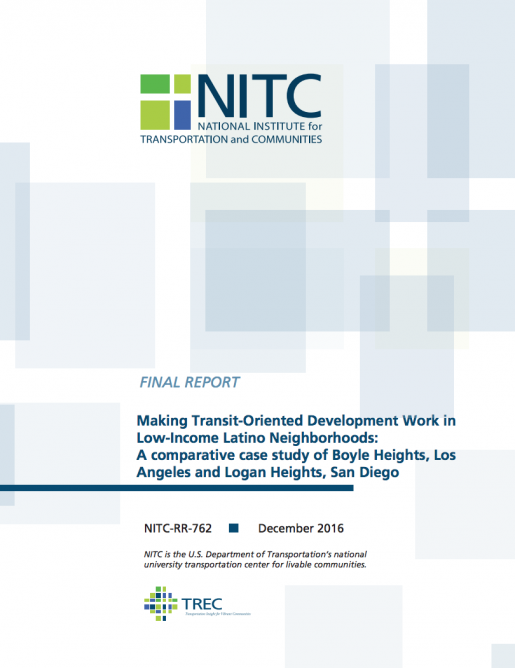
Authors
Publication Date
December 1, 2016
Resource Type
Developing a Model for Transit-Oriented Development in Latino Immigrant Communities: A National Study of Equity and TOD
Multimodal transportation and land use decisions have important effects on vulnerable low-income communities. TOD (transit oriented development) projects can encourage livability and help these communities by providing access to public transportation, affordable housing and jobs via the transportation network (Crane and Schweitzer 2003; Cervero, R.; Ferrell, C; Murphy, S, 2002). NITC is currently funding a comparative case study of TOD projects in Latino immigrant communities in Los Angeles, CA; Oakland, CA; and Hillsboro, OR that have experienced positive equity outcomes. The next phase of research extends this current study to include additional sites focusing on issues of affordable housing, neighborhood retail development, and community activism linked to TOD impacts.
At the conclusion, the comparative research studies will compare and contrast revitalization efforts within communities and equity impacts of six large TOD projects in low-income Latino immigrant communities. These will include (1) MacArthur Park Metro, a subway station in Los Angeles that has spurred revitalization (Sandoval, 2010); (2) Fruitvale Transit Village, a mixed-use development project focused on social services adjacent to a Bay Area Rapid Transit District (BART) station in Oakland (Kirkpatrick, 2007); (3) two adjacent transit stations in a Latino immigrant suburb located along the Westside MAX Blue Line in Hillsboro, Oregon; (4) Vernon Metro Blue Line Rail Station in Los Angeles, located near a predominantly Latino retail sector (5) Pico/Aliso Metro Gold Line Rail Station in East Los Angeles, located in an area with a high amount of affordable housing; and (6) the Barrio Logan San Diego Trolley station near Chicano Park, a node of activism for Latinos in the region. Three of these case studies have already been completed (MacArthur Park, Fruitvale, and Hillsboro) and the funding for this grant will build from those findings and expand into the new three case studies that focus on affordable housing, neighborhood retail, and public participation. The research project will also reveal how, under what circumstances, and through what mechanisms TOD projects can contribute toward urban revitalization in low income Latino communities. The initial findings from the first study reveal that TOD, if done by incorporating endogenous neighborhood characteristics, has the potential of improving low income communities via economic development, affordable housing, social services, community engagement and creative place making in low income Latino neighborhoods.